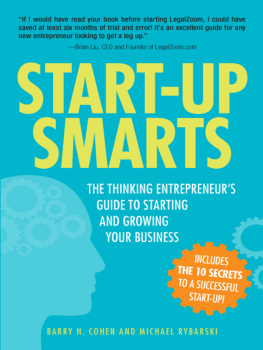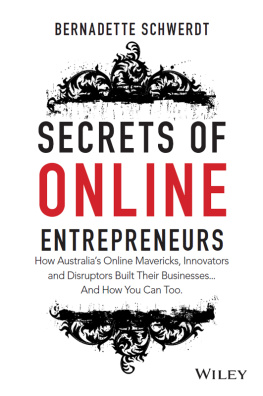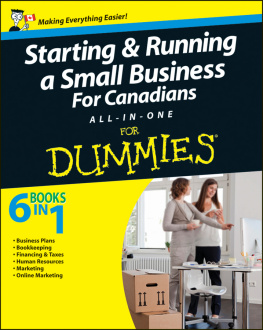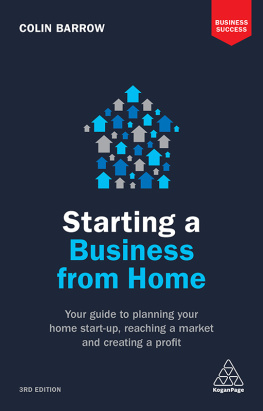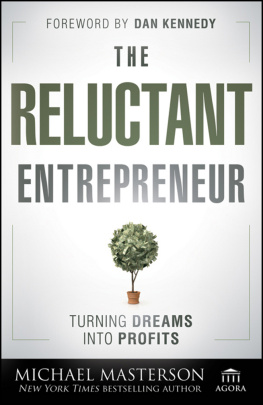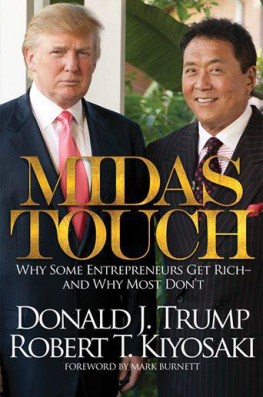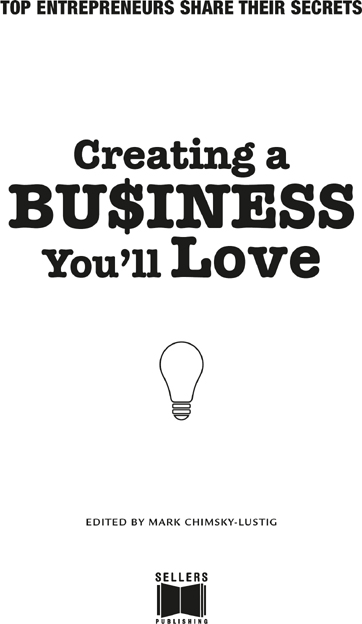Published by Sellers Publishing, Inc.
Sellers Publishing, Inc.
161 John Roberts Road, South Portland, Maine 04106
Visit our Web site:
Cover design by Rita Sowins
Interior design by Faceout Studio
e-ISBN: 978-1-4162-0705-4
Creating a Business Youll Love 2011 Sellers Publishing, Inc. All rights reserved under International and Pan-American copyright Conventions. By payment of the required fees, you have been granted the non-exclusive, non-transferable right to access and read the text of this e-book onscreen. No part of this text may be reproduced, transmitted, downloaded, decompiled, reverse engineered, or stored or introduced into any information storage and retrieval system, in any form, by any means, whether electronic or mechanical, now known or hereinafter invented, without the express written permission of Sellers Publishing, Inc. e-books.
December 2011
C ONTENTS
I NTRODUCTION
There is a large parabolic radio antenna that sits atop a hill overlooking the Stanford University campus in Palo Alto, California. According to a rumor in Silicon Valley, The Dish, as its called, doesnt receive or transmit radio signals at all. Rather, it is a top-secret device invented by Stanford grad students to receive world-altering, billion-dollar ideas from higher beings elsewhere in the cosmos and if you walk around the four-mile-long trail that circles The Dish often enough, you may eventually be blessed with your own billion-dollar idea by the oracle of entrepreneurism.
I have walked The Dish on occasion with my daughter while visiting her at Stanford, where she works as an assistant coach. Neither of us has received a call from the oracle so far, but judging by the number of people who walk that circular path every day and the (loud) enthusiasm with which they discuss their business ideas as they huff and puff and flail their arms along the way, I have no doubt that at least one billion-dollar idea has been, or will be, spawned there.
I have been involved in launching two entrepreneurial ventures during my career. In my first venture, I had the best partners one could wish for. We started a greeting card business, which we called Renaissance Greeting Cards, in the basement of a barn near the Vermont/Massachusetts border. Fourteen years later, we had almost 100 employees, and our products were sold by thousands of retailers throughout North America. We were approached by FTD Holdings, who wanted to purchase a greeting card company to supply its flower store associates. We decided it was a logical next step and went ahead and accepted their offer.
Something was stirring inside me, however. I call it the entrepreneurial itch. I wanted or perhaps needed is a better word to start a new venture that would enable me to pursue my own vision of what a publishing company could be. I submitted my notice, put a home office in one of the bedrooms of my house, and went back to square one. I was a one-person startup. I had to take care of all of the things that my partners had taken care of in my first business. During the day I made cold calls to stores and wrote orders. During the night, after I got my kids to bed (I was a single dad at the time), I designed the products on my desktop publishing system. I invested every cent that I had and borrowed money from my parents in order to launch Sellers Publishing. I published two humorous calendars in my first year, both of which were hits. I reinvested all of the profits into growing the product line in the following year and hired my first employee. We are about to enter our twentieth year, and we now publish more than 200 different calendars. We also publish books, greeting cards, and stationery. Our products are sold around the world. Im very fortunate to work with a team of 60 talented and committed employees.
Sellers Publishing is a smaller company than most of the businesses cited in this book, but many of the challenges entrepreneurs face are similar. All prospective business owners must spend time developing their ideas and testing their viability. All prospective business owners must formulate a business plan, even if its only an informal one. Almost all prospective business owners must find funding to help start and grow their businesses, and they all need to find talented people to join their teams.
I have also been fortunate enough to meet hundreds of other entrepreneurs. If theres one thing Ive learned from my experiences, and from listening to others talk about starting their own businesses, its that the seed idea rarely gets delivered in a lightning bolt of inspiration. Rather, as many of the essayists for this book confirm, inspiration is often born out of necessity and/or frustration.
When Chris Paradyszs digital agency, Elipze, was a victim of the 2001 dot-com meltdown, he knew he needed to regroup and strategize in order to move forward; he did exactly that, using his core business, Paradysz, to create an integrated, successful, full-service digital agency, PM Digital. Liz Lange needed maternity clothes that looked stylish and that breathed, so she started Liz Lange Maternity. Jake Harrimans wartime experiences as a Special Operations Platoon Commander in Iraq, facing brutal conditions, led him to start Nuru International, a social venture dedicated to ending extreme poverty. The impetus to start a new business could be frustration of a different kind. Peter Carlisle realized that his job as an attorney didnt allow him to fulfill his passion for sports, so he left and started a business providing representation and marketing for extreme-sports athletes.
Dont get me wrong, there are business wizards, some of whom have contributed to this book, who were impregnated with their great business ideas in a flash of inspiration. But I assure you that every one of them will vouch for me when I say that muses, if they visit you at all, only do quickies. When you wake up in the morning, they wont be sitting at your bedside with a hot cup of coffee and a notepad (iPad?), waiting to help you write your business plan and they certainly wont be by your side when it comes time to pitch your idea to the bank!
How does one know if a business idea is viable? As you read through Creating a Business Youll Love, I think youll gain some valuable insights that might help you answer this question. I found it intriguing to read about the different processes people used to vet their initial ideas and then modify them based on the feedback they were receiving. Once youve refined your idea, refer to the ten excellent tips for creating a top-notch business plan that Martin Zwilling, founder of Startup Professionals, offers in his essay.
Another thing Ive learned from communicating with others who run their own companies is that all entrepreneurs have a story about how and why they started their businesses, and they all love to tell it. Whats more, every story is different, and every story contains information that is both useful and interesting (dare I say entertaining?) to others who operate, or are considering starting, a business.
This is really where the seed idea for Creating a Business Youll Love came from. Businesspeople love telling their stories. People interested in business love hearing them. Why not publish an entire collection of those stories that could be a resource for anyone with entrepreneurial aspirations?
In fact, it was Paul Hawkens wonderful book, Growing a Business


